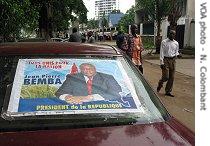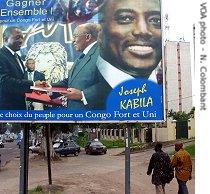Colombant report - Download 377k
A live televised debate was supposed to take place Thursday night between the two candidates in the Democratic Republic of Congo's October 29, post-war election. But, instead, Congolese are expressing disappointment and the rival political camps are trading accusations, after the debate's cancellation. Helicopters from a European rapid reaction force whiz overhead in the tense capital. Underneath, activists gather around one of the residences of second-round candidate and former rebel leader Jean-Pierre Bemba.
![]()
Listen to Colombant report
![]()
One of them says the debate must take place. He says Congolese must see who is capable and who is not capable.

Bemba supporters display election poster on car, Oct. 26, 2006
He also says they must realize president and candidate Joseph Kabila speaks French with an accent and would be very limited in his answers.
But the media authority canceled the planned debate after the two candidates disagreed on its format.
Mr. Kabila's camp said it wanted a pre-recorded debate, with the two candidates answering the same questions but from different locations, citing security reasons.
Mr. Bemba said he wanted a live, face-to-face debate to gauge "intellectual capacity."
A resident in Kinshasa shared his opinion with VOA about why the debate would have been helpful.
"People want to know what is the program of the men who want to lead our country," he said. "We had a lot of problems during the war. The country collapsed. We have lots of problems in the economy, social [situation], environment, in politics and people want to know what and how the candidates will find good solutions to help Congo to go up, to go on."
 |
| Kabila poster, Oct. 26, 2006 |
He says Mr. Bemba might well jump from his lectern and attack Mr. Kabila.
Mr. Bemba's supporters say Mr. Kabila is not the son of former coup leader Laurent Desire Kabila, who was assassinated in 2001, but rather a handpicked successor who is not Congolese. The young Kabila denies this.
He has not campaigned during the second round, saying it is too dangerous - preferring to send his wife, instead.
An organizer from a small political faction boycotting the election process, Mbwebwe Kabamba, says the debate was trivial, given the current context.
Nothing in the campaign, he says, has been marked by principles of democracy, debate and tolerance. He says everywhere in the Congo campaigning degraded into clashes.
Debate or no debate, he says, the most important thing is to have elections that lead to lasting and stable peace after years of bad governance and conflict.
Related articles
- • Felix Tshisekedi Sworn In as DR Congo President (January 24, 2019)
- • Constitutional Court Declares Tshisekedi Winner of Presidential Election (January 19, 2019)
- • Felix Tshisekedi Vows to Be the President of All Congolese (January 10, 2019)
- • Felix Tshisekedi Elected DR Congo President (January 10, 2019)
- • DR Congo Delays Results of December Election (January 6, 2019)
- • Botswana Urges Joseph Kabila to Step Down (February 26, 2018)
- • No elections in DR Congo in December without electronic voting machines: INEC (February 13, 2018)
- • US Warns DR Congo Against Electronic Voting for Delayed Election (February 12, 2018)
- • Felix Tshisekedi accuses INEC of illegally prolonging Kabila's mandate (October 24, 2017)
- • DRC Seeks Arrest of Presidential Candidate Moise Katumbi (May 19, 2016)
- • Papa Wemba Is Buried in Kinshasa (May 4, 2016)
- • Papa Wemba Awarded Highest National Honor as Thousands Pay Tribute (May 2, 2016)
- • Rights Groups: DR Congo Must Free Pro-democracy Activists (April 13, 2015)
- • Police Open Fire on Crowd Protesting Election Law Change (January 19, 2015)
- • Etienne Tshisekedi Evacuated to Belgium for Medical Treatment (August 16, 2014)
- • Kerry Calls on Kabila to Honor Constitution (May 4, 2014)
- • Kerry in DR Congo for Security Talks (May 3, 2014)
- • DR Congo Takes Chairmanship of COMESA at Summit in Kinshasa (February 26, 2014)
- • DR Congo Honors Nelson Mandela, Hero and Model for Humanity (December 6, 2013)
- • Kabila Congratulates Congo Army for Defeating M23 Rebels (October 30, 2013)
- • DR Congo Eases Process for Starting a New Business (June 3, 2013)
- • Regional Leaders Sign DR Congo Peace Deal (February 24, 2013)
- • The M23 Rebels Want to Overthrow Kabila? Nonsense (November 28, 2012)
- • Protests Against M23 Rebels, Government and UN Spread (November 22, 2012)
- • Thousands Protest M23 Capture of Goma, Turn on Government and UN (November 21, 2012)
- • DR Congo Officials Vow to Defend Goma Against M23 Rebels (November 19, 2012)
- • At high-level meeting, Ban urges political solution to crisis in eastern DR Congo (September 27, 2012)
- • US Cuts Military Aid to Rwanda Over Support to Rebels in DR Congo (July 21, 2012)
- • DR Congo, Rwanda Sign Pact to Fight Rebels in Eastern Congo (July 15, 2012)
- • Police Investigate Former Prime Minister for Corruption (May 14, 2012)







